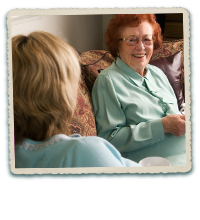FOR IMMEDIATE RELEASE
Seven Ways to Plan for the Cost and Burden of Supporting those with a Dementia Diagnosis
Walnut Creek, CA – (April 9, 2013) It’s a tough pill to swallow but the cost of caring for those with a dementia will double by 2040 due to the increasing number of people developing the disease. The RAND Corporation released an expansive study in the New England Journal of Medicine on the financial burden and how much American families will be paying for care. According to the study, the average individual cost, including lost wages for a family member, is about $41,000 per year. With some living with Alzheimer’s for 20 years before death, that’s over $800,000 worth of care, privately purchased and given by a family member!
Linda Fodrini-Johnson, MA, MFT, CMC, Executive Director of Eldercare Services located in Walnut Creek, Oakland, San Francisco and Marin and past President of the National Association of Professional Care Managers (NAPGCM), states that these individuals will overwhelm the medical systems and the government programs. Fodrini-Johnson adds, “We can all hope and wait for a cure for Alzheimer’s or we can be realistic and start planning for these costs. It is smart to plan proactively, upon diagnosis, before the dementia really goes south.” The study points out that the baby boom generation is not prepared for this tremendous growth in needed services and families are not prepared for the real cost of caring for someone with a dementia.
Professional Care Managers can help the family budget and plan for the cost and burden of care. “My experience is that families that learn to share the care, give care with training, attend support groups, have a care manager as a “coach” and use community respite programs, are able to care longer and without placing a loved one in a facility,” says Fodrini-Johnson.
Here are seven ways a Professional Care Manager can help families early in the disease process plan for cost as well as burden:
1) Review available resources. Look at total resources available for care and plan how and when to spend those resources. In some areas, it is best to save some resources to pay for the early months in skilled care before Medicaid starts.
2) Determine who will provide the care. Look at family and friends who have committed to assist with the care and plan a system of sharing the care that doesn’t burnout or burden the primary caregiver.
3) Utilize community resources. Help the family use community resources such as respite programs and “free systems of companion care” before having to spend dollars on home care.
4) Educate families. Teach families on how to communicate in order to reduce stress, adverse behaviors and preserve dignity of the individuals with dementia.
5) Modify Homes. Teach families how to retrofit their homes for safety and recommend technology to guard against wandering.
6) Systemize the medical needs. Set up systems of medication and medical care attention that secure the best level of care.
7) Enable legal and entitlement advice. See that families have legal advice that will allow them to apply for government benefits. Educate the family on all the entitlements and benefits available – they can differ from community to community.
The bottom line is that a Professional Care Manager can often reduce the necessary expenditures and stress by preventing or delaying events such as hospitalizations from occurring. “A small investment now might save families a lot of time and money as the disease progresses – a type of maintenance. Americans want their cars to run smoothly so we invest money each year in their maintenance to avoid a worst case scenario and much larger costs if it breaks down. Why not invest in our loved one’s maintenance so they can have a better quality of life?” says Fodrini-Johnson.
Families can find a Professional Care Manager at www.caremanager.org or locally at www.EldercareAnswers.com and should look for those with experience and certifications. Families hiring Care Managers should be sure the Care Manager is a member of the National Association of Geriatric Care Managers (NAPGCM).
About Eldercare Services: Linda Fodrini-Johnson, MA, MFT, CMC, is the Founder and Executive Director of Eldercare Services and past President of the National Association of Professional Geriatric Care Managers (NAPGCM). Eldercare Services has continuously served adults of all ages for 24 years. She was named one of Bay Area News Group’s Hometown Heroes in 2010.
The diverse group of 20 certified, Professional Care Managers has backgrounds in Nursing, Family Counseling, Psychology, Physical Therapy, Social Work, and Public and Health Administration. Eldercare Services is a pioneer in a unique delivery of services, providing counseling, Professional Care Management, In-Home Care (http://eldercareanswers.com/), family support groups and community education serving Bay Area seniors and their families with offices in Walnut Creek, Oakland, San Francisco and Larkspur, California.
For more information on Eldercare Services, visit www.EldercareAnswers.com.
Contact: Danielle Miller | Marketing Communications Manager
Eldercare Services | (866) 760-1808 | www.EldercareAnswers.com






